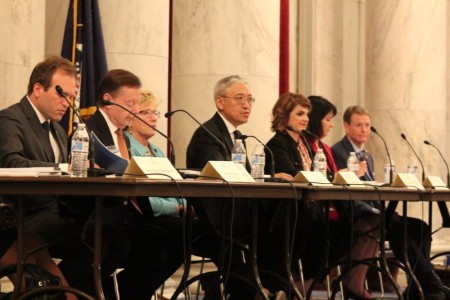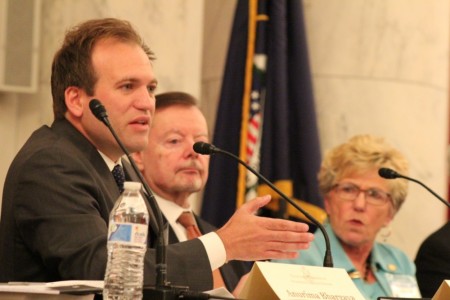China in a persecution category 'all by itself;' USCIRF releases annual report

WASHINGTON — Persecution against believers in China was front and center as the U.S. Commission on International Religious Freedom released its 20th annual report Monday morning.
With photographs on the cover showing demonstrations against China’s imprisonment of thousands of Uighur Muslims, the bipartisan and independent commission mandated by Congress unveiled its 226-page report highlighting about 30 countries where religious freedom rights are being egregiously violated.
As is the case in past years, the report divides countries into different tiers, with “Tier 1” recommendations representing countries that the Commission believes should be labeled by the U.S. State Department as “countries of particular concern” (CPC). The CPC label carries with it the possibility that the countries could face sanctions or other negative consequences.
“Tier 2” identifies countries where religious freedom violations have happened but have not risen to the severity needed to be considered Tier 1.
USCIRF recommends that 16 countries be labeled as CPCs by the State Department, 10 of which were designated or redesignated as CPCs by the State Department last November.
The Tier 1 countries are: Burma, Central African Republic, China, Eritrea, Iran, North Korea, Nigeria, Pakistan, Russia, Saudi Arabia, Sudan, Syria, Tajikistan, Turkmenistan, Uzbekistan and Vietnam.
“As has been said several times this morning, we have a Tier 1 and Tier 2 of the countries we look at,” USCIRF Commissioner and longtime social conservative activist Gary Bauer said during a rollout event on Capitol Hill attended by a bipartisan group of lawmakers.
“If we were going to rank the Tier 1 countries, China would be in a category all by itself [with] the level of persecution. They are an equal opportunity persecutor.”
With the U.S. and China on the cusp of a major trade deal, USCIRF’s report serves as one last call for U.S. officials to “integrate religious freedom and related human rights diplomacy” into the ongoing trade negotiations.
USCIRF calls for such diplomacy to also occur in the U.S.-China Diplomatic and Security Dialogue and other levels of the relationships between the U.S. and China.
The trade negotiation comes as China’s persecution against Uighur Muslims, underground Christian communities, Fulan Gong and Tibetan Buddhists have continued unabated.
The USCIRF report notes that estimates show that as many as 800,000 to 2 million Uighur Muslims have been detained in Xinjiang.
Even though the Chinese government and the Vatican came to an agreement last year, “repression of the underground Catholic Church increased during the latter half of the year” and also continued into 2019.
Additionally, Chinese authorities closed or raided hundreds of Protestant house churches in 2018 and continue to do so in 2019.
While the Chinese government continued to use advanced surveillance technology and other measures to repress Tibetan Buddhists, over 900 Falun Gong believers are said to have been arrested over the course of 2018 for either practicing their faith or distributing religious literature.
To make matters worse, USCIRF warns that the barrier between religion and the Communist Party in China was further eroded in March 2018 when the jurisdiction over religious affairs was transferred from a government entity to “an organ of the Chinese Communist Party.”
“They go after anybody of any faith that might compete with the communist, atheistic government of China for the loyalty of its citizens,” the 72-year-old Bauer warned. “It is deeply disturbing to see that ... China is an expanding power — a country getting more and more powerful by the year. To have a country with these ideas and this degree of persecution ought to be something that scares everyone.”
Although USCIRF has designated China as a Tier 1 country for 20 years the situation is “getting worse,” Bauer stressed.
He added that USCIRF commissioners are working with administration officials to push the idea that negotiations with China should be more than just about “tariffs and jobs” but also about the idea that every person is able to worship the way they see fit.
“We are also asking this year of specific targeting of individuals,” Bauer said. “We know the names of individuals in China that are working for the government that is engaged in this persecution, whether it is the Muslim Uighurs or the Falun Gong, Christians or Tibetan Buddhists. We need to call them out by name and do everything we can to shame them.”
Bauer also called out U.S. corporations that have their own trade relationships with China.
“Trade with China was supposed to change China,” he said. “It ended up that trade with China ended up changing America as more and more corporations became dependent on the goodwill of the Chinese government.”
USCIRF continues to call for Russia and Uzbekistan to be listed as a CPCs.
Although USCIRF also made those recommendations in its report last year, the State Department did not designate those two as CPCs last year.
Instead, they were placed on a “Special Watch List” for governments that have engaged in or tolerated “severe violations of religious freedom.”
Religious freedom advocates have put much pressure on Russia in the last couple of years since it passed an anti-terrorism law that gives the state the ability to crack down on nonviolent religious activities, such as evangelism.
In addition to evangelical Christians, Russia’s crackdowns have also led to the arrest of several Jehovah’s Witnesses.
According to Jehovah’s Witness spokesperson Jarrod Lopes, who attended the USCIRF event, at least 186 Jehovah’s Witnesses are facing criminal charges in Russia and Crimea, with 24 in pretrial detention and 25 under house arrest.
The USCIRF report also calls on the U.S. government to enforce sanctions and other deterrence measures against countries designated as CPCs.
According to the report, only six of the 10 countries the State Department designates as CPCs are actually subject to preexisting or “double-hatted” sanctions, while the four other countries (Saudi Arabia, Tajikistan, Pakistan and Turkmenistan) benefit from waivers sparing them from any punitive action.
USCIRF called on the Trump administration to lift its waiver sparing Saudi Arabia of punitive action after last week’s mass execution of 37 Saudi nationals, a majority of whom were Shi’a Muslims.
USCIRF Commissioner Johnnie Moore was among a group of evangelical leaders who met with Saudi Crown Prince Mohammed bin Salman last year. He was also part of the first USCIRF delegation to visit with Saudi religious police.
“When I visited the kingdom this year and you sit down and you talk about the efforts to reform the kingdom, everybody talks about key performance indicators — the KPIs [key performance indicators],” Moore said. “On the basis of the KPIs, unquestionably the kingdom of Saudi Arabia is one of the most egregious offenders of religious liberty and that is why it is a CPC.”

However, Moore contended that there are reasons for optimism in Saudi Arabia.
“The minister of Islamic affairs was clear to us in the meeting that Saudi Arabia is not a kingdom anymore where there can only be one religion,” Moore added. “It is a kingdom where there are lots of different things happening — some things that are the worst in the world. On the same token, there is a glimmer of light and we are trying to do what we can to shimmy open that door.”
USCIRF recommended the following countries be designated as “Tier 2” countries of concern: Afghanistan, Azerbaijan, Bahrain, Cuba, Egypt, India, Indonesia, Iraq, Kazakhstan, Laos, Malaysia and Turkey.
In India, persecution against Christians and other religious minorities in certain states has greatly increased over the last several years at the hands of Hindu extremists emboldened by the rise to power of the Bharatiya Janata Party.
Despite carrying out acts of persecution against religious minorities, Hindu extremists have often received a level of impunity from local authorities.
USCIRF Commissioner Anurima Bhargava, a human rights lawyer who served in the Obama Justice Department, told The Christian Post that USCIRF officials have not been able to visit India in many years. She said the commission is concerned with the extent to which the government is “tolerating religious freedom violations.”
“It is difficult for anyone to try and verify and try to understand what is happening on the ground. There is a lot of reports and there is, of course, a kernel of truth in them but we have to figure out the parameters or the context of that,” she explained. “For the commission to make the kind of recommendations and informed engagement, we want to have more of an engagement with the government and partners in the country to go and spend some time there.
USCIRF Vice Chair Kristina Arriaga told said that the situation in her homeland of Cuba has “deteriorated dramatically in the last year.” Last week, USCIRF spoke out against the imprisonment of two Christian homeschool parents in the communist island nation.
Worldwide, places of worship are often becoming a favorite “soft target” for terrorists, as seen in the recent attacks against places of worship in Sri Lanka and New Zealand.
The new USCIRF report recommends that the State Department and the Department of Defense allocate funding “to train and equip local officials and communities to protect places of worship and other holy sites, especially in countries where such sites face a high risk of attack.”
USCIRF Commissioner Tony Perkins, who also heads the social conservative advocacy organization Family Research Council, explained that the U.S. government already has a program in place to help foster greater security at vital installations like power plants and government facilities overseas called the Antiterrorism Assistance Program.
“So, one of our specific recommendations to the Department of State and Department of Defense is to create and establish programs that would work with foreign governments to provide training and equipment if necessary to these houses of worship to secure them,” Perkins said.
Follow Samuel Smith on Twitter: @IamSamSmith
or Facebook: SamuelSmithCP





















